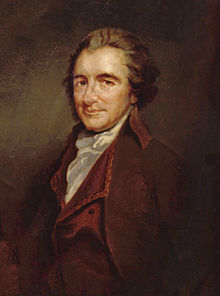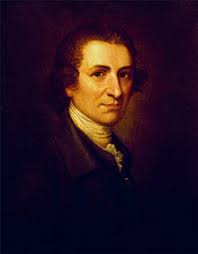
Thomas Paine’s pamphlet, “Common Sense,” appeared in the session of the Continental Congress.
At the time, Paine was virtually unknown. Living in his birthplace of England, he had met Benjamin Franklin when one of Franklin’s fellows in the Royal Society had introduced them. Paine’s life and career had, at that point, consisted of one failure after another, from corsetmaking to schoolteaching to shopkeeping to tax-collecting. Like Franklin, he was self-taught, and, again like Franklin, he was an engaging writer. He also had a distaste of British authority. When Paine indicated to Franklin that he hoped to emigrate to America, Franklin was only too happy to supply a letter to his son and law, Richard Bache, calling him “an ingenious, worthy young man.” Franklin asked a favor: “If you can put him in a way of obtaining employment as a clerk, or assistant tutor in a school, or assistant surveyor (all of which I think him very capable,” so that he may procure a subsistence at least, till he can make acquaintance and obtain a knowledge of the country, you will do well and much oblige your affectionate father.”
Paine’s connection to Franklin proved beneficial, to say the least. Arriving on the shores deathly ill, doctors looked after him after learning of the connection, and several Philadelphians were willing to allow him to tutor their children.
Dr. Benjamin Rush (whose birthday we celebrated last week) would prove to be even more beneficial. Rush was browsing in Richard Aitken’s bookstore in te second week of March, 1775, when he was introduced to Paine. (Aitkein had temporarily hired him to edit his Pennsylvania magazine or United States Monthly Magazine.) Paine told Rush he hoped “to teach a school, or to give private lessons upon geography to young ladies and gentlemen,” and this struck a responsive chord, as Rush too was interested in establishing a school for young ladies that would teach them how to do more than become a homemaker. After Rush read Pain’s essay “African Slavery in America” which argued for the emancipation of all salves, something Rush believed in as well, he had an idea. Rush had already “put some thoughts upon paper” on the subject of separating from England. However, he had hesitated to have it published. “I shuddered at the prospect of the consequence of its not being well received.” Possibly he was concerned about the damage it might do to his medical practice.
He urged Thomas Paine to take on the project. What he wanted Paine to do was an article that would prepare “citizens for a perpetual separation of our country from Great Britain by means of a work of such length as would obviate all objections to it.” Paine “seized the idea with avidity and immediately began” the pamphlet.
When Paine presented the pamphlet to the doctor, Rush had one change to recommend. Instead of calling it “The Plain Truth,” he suggested “Common Sense.”
Bow Tie Tours

